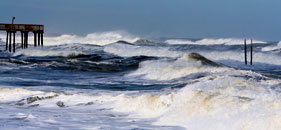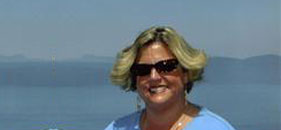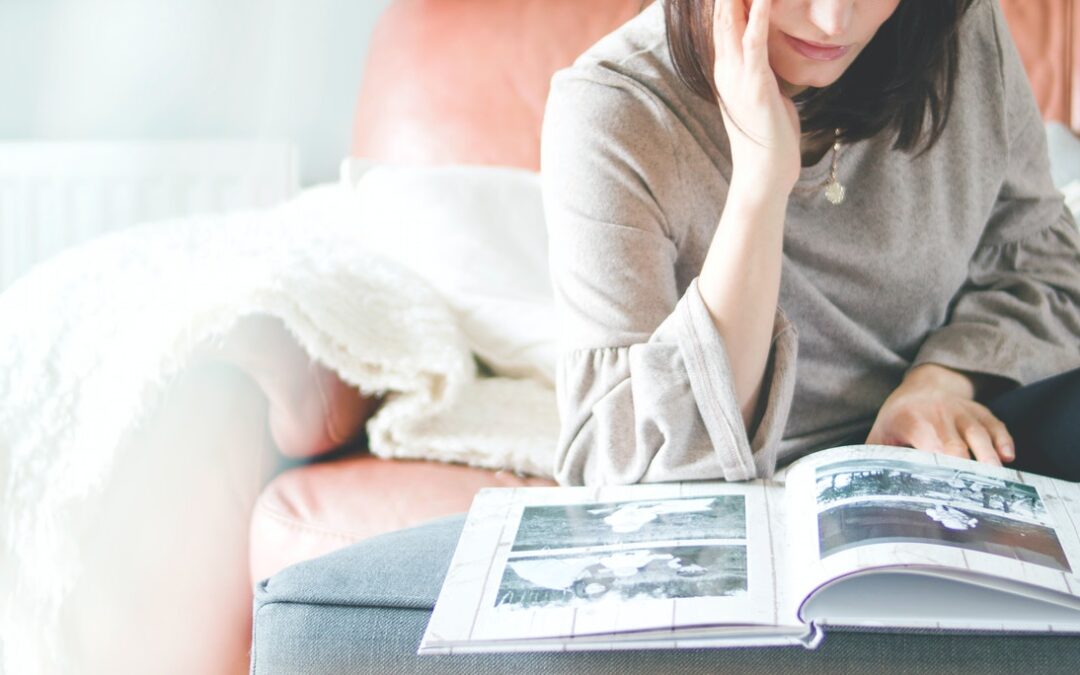
The Stormy Beach
I thought of this story because I was talking about protecting Philip, and because of how deeply we’re affected by the vulnerability we share with our kids. Because we do share it. I might be the one who’s supposed to be doing the protecting, but look at the price I pay if I can’t.
The summer when Philip was four or five and Natalie was two or three, we stayed overnight in Point Pleasant, NJ, with Janine and her son Jake. It was hot and sunny and sticky and when we got to the beach, it was closed. If there was such a thing as a triple-X red flag, it would’ve been flying. I’ve never seen a beach this way. The water was hurling itself at the shore, right up to the boardwalk. In fact, there was no shore; just a boardwalk and lots of hysterical water.
Do Not Enter or not, the beach wasn’t roped off, so we went down the boardwalk stairs just to gape. I’m a weather girl. Not as in, oh, it’s warm and sunny so we should get our asses out and do something. I mean as in ice storms, snowstorms (which my town has decided to call “snow events,” leaving me to wonder just what it is our Town Officials spend the better part of their time – and our money – doing), rainstorms, thunderstorms, storms of any kind. The more nature misbehaves, the better. Of course, all I know is the NY Metro area kind of weather, not the Storm-Chaser, Dorothy’s-house-flying-through-the-air kind. The ocean that day might not be classified as “weather,” but it was Nature being Really Exciting.
The five of us stood just under the boardwalk, Janine and I holding our kids’ hands. No one else was there because really, no sane person would’ve been. You could see what was going on from the top of the boardwalk; no need go down those stairs to get under it. But we did, and the panorama of that unobstructed wild ocean letting its white, foamy hair down and shaking it out with a vengeance was mesmerizing.
Possessed, I took Philip’s still-chubby four-(or five)-year-old hand and walked deeper into that maniacal frothing sea. I was both thrilled and terrified; for God’s sake, I wouldn’t know how to float in a bathtub, never mind do a free-stroke or a backstroke or any other stroke that was supposed to keep my head above more than about four feet of water; what the hell was I doing tempting fate?
Correction. What was I doing tempting fate with my child?
I’d say it was a modified version of that thrill-seeking thing that makes people jump out of airplanes or climb big, scary mountains. And I think that attraction, dangerous as it is, is the pull of life. It’s the need to have all your senses mobilized and attentive, so there isn’t you and the ocean or the sky or the mountain because you are the ocean and the sky and the mountain. I mean, you’re not thinking about anything except what you’re doing, and how peaceful is it not to have to listen to the damn whining voices in your head. It’s what I’d thought meditation was about, but I hadn’t the patience to get there by sitting around and trying not to think. And here was an unsought opportunity to shock myself awake.
We didn’t walk far. We couldn’t. The water rushed at us, smacking my shins and splashing up my thighs, then rushed back on itself, trying to take us with it. It was gorgeously, savagely, beautiful; it was The Call of the Wild that I wanted to answer, but I didn’t know how.
So I turned to go back to the boardwalk, and a few steps later I realized I’d let go of Philip’s hand. I had stood there marveling at the ferocity and velocity of that ocean and then I dropped my son’s hand. I don’t remember doing it, I just remember spinning around in shock and dread, to see that Philip had been knocked down to his hands and knees, and some woman was helping him to get up.
What followed was some eerie dream-like sequence where I moved toward her and she gave Philip’s hand to me and I took it, unable to see what I’m sure were her accusing eyes behind her sunglasses, unable to say anything because the enormity of what I’d done was already taking hold, because the roaring of the ocean wouldn’t have allowed me to be heard anyway. Then somehow I was back at the boardwalk, back to Janine, who hadn’t seen any of it. I didn’t tell her. If I had, I would have had to say, “I think I almost let my child die.” That he didn’t die didn’t change my carelessness. It wasn’t because of me that he didn’t die. It was because of that woman, whoever she was, wherever she came from. As far as I was concerned, she saved his life.
For years, right up until Philip died, I’d get slightly sick and slightly dizzy when I thought about that day. For just a second my stomach would lurch. I told Philip about it once, but he just shrugged it off. What did it matter to him? He didn’t even remember it.
But after Philip died, the truth of that day hit me, and it knocked me over like one of those big old waves did to him. My son wasn’t saved that day; I was. Because if he would have died then, I don’t know what shell of a person I would have become and what Natalie would have had to suffer because of it. Look; Philip was a young man on his own, and I couldn’t protect him from the choices he made, or the body he was given. But he is my son. He was vulnerable and I was helpless. That I can work through; and to a degree, I have. But if I’d lost him then? If he had died because of my carelessness when I was supposed to be taking care of him?
My heart is on its knees in gratitude. I was graced that day, and I understand the difference between the way it happened and what it would have been like if it had happened then. It’s a nightmarish way to get perspective. But if my son had to die, better it be with my conscience clear.
Submitted by Denise Smyth in loving memory of her son, Philip.
You can find out more about Denise Smyth and her son Philip on her blog, forphilip.com.





 This website was inspired by the memory of Margareta Sol Kubitz in hopes of helping others work through the pain of grief.
This website was inspired by the memory of Margareta Sol Kubitz in hopes of helping others work through the pain of grief.